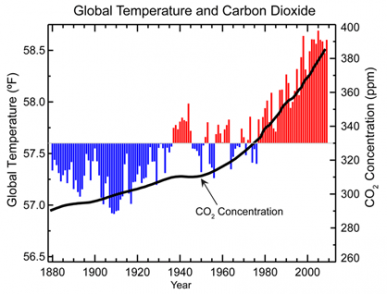How to clear the gridlock on climate change

Image by Steve Snodgrass/Flickr
Most of us, in dealing with opposition from a spouse or a child, have the tendency to try one more analogy, restate our position using different words, or just say it louder. All those behaviors are based on the belief that the other person just doesn’t understand what we’re saying. If we could only make our position clear, he or she would embrace it.
Unfortunately, a lot of political dialogue follows this path, too. We can’t believe the other side doesn’t get it – on gun control or health care or national security. We think of new phrasing, print up data charts or find new spokesmen to deliver our message. We rarely consider the possibility that they understand what we’re saying, but that their perspective generates a different logical conclusion.
This mental block has been a serious problem when it comes to the climate change debate over solutions. Environmentalists, seeing the enormity and urgency of the problem, propose bold action. Conservatives, who believe well-intentioned government policies often have bad unintended consequences, resist that action.
Environmentalists remind everyone of the danger we face – with photos of melting glaciers, video of stronger storms and graphs of rising pollution – and hope the message will finally hit home. Conservatives point to government programs they believe have set the nation on the wrong course, and resist the effort to implement new ones.
That’s where we’re stuck right now. And to get unstuck, I think, will require a change in tone from both sides. As I said in a previous post, it just doesn’t make sense to write off a hundred million of your fellow Americans as fools for disagreeing with you.
Environmentalists must continue to show the public the dangers we face from loading the atmosphere with greenhouse gases, and do it in as vivid and compelling a way as possible. Conversely, conservatives who believe some government programs can be harmful to the ends they seek to achieve should continue to make their case – outlining smarter ways to address issues.
But both sides should do it with an understanding that most of those who disagree with them are not dumb or evil. And we should all be willing to accept those facts that are well established. For instance, progressives should accept that because a problem needs solving it doesn’t mean that every proposed solution is a good one. At the same time, conservatives who have an inclination to reject what they consider “hysteria” and prefer to be guided by data should follow that data where it leads. If the vast majority of respected scientists and major scientific organizations have agreed on global warming causes and found greenhouse gas pollution is causing dangerous changes to our world, that should be stipulated in the discussion of solutions.

From the National Oceanic and Atmospheric Agency
None of this is meant to suggest that everyone will be convinced by a civil, balanced discussion. Or that the dysfunction in this national conversation can be equally blamed on both sides. In previous climate change debates there have been loud, well-funded and highly irresponsible voices that deliberately sought to obscure the fact that man-made climate change is real. Interest groups and talking heads who call climate change a “hoax” are either badly misinformed or deliberately misleading, and they will never accept facts that contradict their political goals.
But there are many thoughtful people who have been skeptical but are willing to base their views on the evidence. And opening a conversation with them, in a respectful way, will only increase the chances that we can address this problem in time to avert the worst impacts of climate change. There is at least some evidence that our efforts are working in the population at large. In 2009, only 35 percent of Republicans believed that climate change was real; today the number is 48 percent. And ultimately, if we win over their constituents the politicians will follow.












Keith -
With all due respect, I as an Independent, and global warming skeptic, do not resist the dismantling of the U.S. economy specifically and western society generally JUST because government and politicians are exceedingly poor at efficient deployment of tax dollars. No, I (and many independents, conservatives and (eek) liberals) oppose destroying our way of life to fix a problem, posited by flawed scientific studies and politicized by the IPCC, that doesn't exist!
Meet the New Climate Deniers
By Rich Lowry - April 2, 2013
There are few things sadder than the “climate denier.” He ignores the data and neglects the latest science. His rhetoric and policy proposals are dangerously disconnected from reality. He can’t recalibrate to take account of the latest evidence because, well, he’s a denier.
The new climate deniers are the liberals who, despite their obsession with climate change, have managed to miss the biggest story in climate science, which is that there hasn’t been any global warming for about a decade and a half.
“Over the past 15 years air temperatures at the Earth’s surface have been flat while greenhouse-gas emissions have continued to soar,” The Economist writes. “The world added roughly 100 billion tons of carbon to the atmosphere between 2000 and 2010. That is about a quarter of all the CO2 put there by humanity since 1750.” Yet, no more warming.
The Economist has been decidedly alarmist on global warming through the years, so it deserves credit for pausing to consider why the warming trend it expected to continue has mysteriously stalled out.
The deniers feel no such compunction. They speak as if it is still the late 1990s, when measurements of global temperature had been rising for two decades. In his State of the Union address, President Barack Obama said that “we can choose to believe in the overwhelming judgment of science and act before it’s too late.” In a passage devoted to global warming, though, he didn’t mention the latest trend in global warming.
A denier feels the same righteous sense of certitude now, when warming has stopped, as he did a decade ago. Washington Post columnist Eugene Robinson recently opined that “sensible people accept the fact of warming” — but apparently not the fact of no-warming. He scorned those “who manipulate the data in transparently bogus ways to claim that warming has halted or even reversed course.” Does he include James Hansen, the famous NASA scientist, among these dastardly manipulators? No one this side of Al Gore has warned as persistently about global warming as Hansen. He nonetheless admits that “the five-year mean global temperature has been flat for a decade.”
None of this means that the Earth didn’t get hotter in the 20th century, or that carbon emissions don’t tend to create a warmer planet, or that warming won’t necessarily begin again. It does mean that we know less about the fantastically complex global climate system than global-warming alarmists have been willing to admit. The Economist notes the work of Ed Hawkins of the University of Reading in Britain. He has found that if global temperatures stay the same for a few more years, they will fall below the range of 20 climate models. In other words, the scientific “consensus” will have been proven wrong.
Why the stall in warming? According to The Economist, maybe we’ve overestimated the warming impact of clouds. Or maybe some clouds cool instead of warm the planet. Or maybe the oceans are absorbing heat from the atmosphere. Although the surface temperature of the oceans hasn’t been rising, perhaps the warming is happening deep down. James Hansen thinks new coal-fired plants in China and India, releasing so-called aerosols into the atmosphere that act to suppress warming, may be partly responsible for the stasis in temperatures.
Hansen writes that knowing more about the effect of aerosols on the climate “requires accurate knowledge of changes in aerosol amount, size distribution, absorption and vertical distribution on a global basis — as well as simultaneous data on changes in cloud properties to allow inference of the indirect aerosol forcing via induced cloud changes.” Is that all? He ruefully notes that the launch of a satellite with a sensor to measure all of this failed, with no follow-up mission planned.
Hey, but don’t worry. The science is all “settled.”
What is beginning to seem more likely is that the “sensitivity” of the global climate to carbon emissions has been overestimated. If so, the deniers will be the last to admit it.
Lukas Jackson
April 3, 2013 at 9:05 am